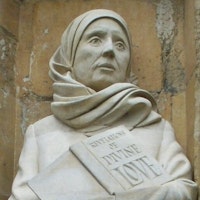God Is Our Father and Mother
Topic: Divine Love & Goodness
Whereof it follows that as truly as God is our Father, so truly is God our Mother. Our Father wills, our Mother works, our good Lord the Holy Ghost confirms. And therefore it belongs to us to love our God, in whom we have our being… for in these three is all our life… And therein is a forth-spreading, by the same grace, of a length and breadth, of a height and a deepness without end. And all is one love.
Julian of Norwich (c. 1343–after 1416) was an English anchoress and mystic of the Middle Ages. She is renowned for her book Revelations of Divine Love, which is considered one of the earliest surviving works of English literature written by a woman.
Julian lived in the city of Norwich during a tumultuous period marked by the Black Death and the Peasants' Revolt. In the midst of these upheavals, she experienced a series of profound visions of the Passion of Christ in 1373, when she was around 30 years old. These visions transformed her understanding of God's love, leading her to believe that all people are loved unconditionally by God, even in their sinfulness.
Julian's Revelations of Divine Love is a beautiful and moving meditation on the love of God, exploring themes such as the compassion of Christ, the forgiveness of sins, and the hope of salvation. She also delves into the mystery of suffering and the role of pain in spiritual growth. Although her writings were not published during her lifetime, they were carefully preserved by her followers and later rediscovered and translated into English in the 19th century. Today, Julian of Norwich is recognized as one of the most important Christian mystics and theologians, renowned for her profound insights into the nature of God's love and her emphasis on the harmony between faith, nature, and grace.
Revelations of Divine Love
Julian of Norwich. The Revelations of Divine Love of Julian of Norwich, trans. James Walsh (Harper and Brothers: 1961), 162. [The Fourteenth Revelation, ch. 59 (Long Text)].

Julian of Norwich
Theme: Divine Father and Mother


About This Julian of Norwich Quote [Commentary]
Julian of Norwich affirms with clarity, “As truly as God is our Father, so truly is God our Mother.” This pairing is not symbolic but real, grounded in her experience of the Divine. God the Father “wills,” and God the Mother “works”—distinct yet unified movements within the same love. By naming both roles, Julian speaks to the fullness of God’s relationship with creation. These are not opposing images but complementary expressions of divine care and purpose. Her insight invites a more complete understanding of the Divine as both origin and sustainer.
The context passage carries this vision further: “Our Father wills, our Mother works, our good Lord the Holy Ghost confirms.” Each aspect is active, interwoven, and complete. From this movement flows “a forth-spreading… of a length and breadth, of a height and a deepness without end.” Julian draws from Ephesians to describe divine love as immeasurable in every direction. She emphasizes that “in these three is all our life,” a unity not of sameness but of shared love. God is revealed not in part, but in a wholeness that includes will, work, and confirmation.
Julian concludes, “And all is one love.” God, in whom “we have our being,” is not divided by gendered roles but revealed through them. Her language honors both divine Father and divine Mother, holding them in balance. This is not a shift in doctrine but an invitation to receive a love that is both guiding and sustaining. By recognizing these aspects together, Julian offers a vision of the Divine that is spacious, relational, and complete.
About This Quotation [Excerpt]
Whereof it follows that as truly as God is our Father, so truly is God our Mother. Our Father wills, our Mother works, our good Lord the Holy Ghost confirms. And therefore it belongs to us to love our God, in whom we have our being… for in these three is all our life… And therein is a forth-spreading, by the same grace, of a length and breadth, of a height and a deepness without end [see Ephesians 3:18–19]. And all is one love.
Richard Rohr’s Commentary about this Quotation in The Divine Dance:
The Trinity and Your Transformation, reflects deeply on Julian of Norwich’s proclamation, “As truly as God is our Father, so truly is God our Mother,” highlighting her bold use of feminine imagery to describe the Divine. Rohr notes, “Julian of Norwich, the fourteenth-century English mystic, was not afraid to speak of God in feminine imagery. She even referred to Jesus as ‘our Mother’ because she recognized that the divine nature transcends our limited human notions of gender.”
—Rohr, Richard. “The Divine Dance: The Trinity and Your Transformation.” Whitaker House, 2016, p. 123.
Resources
Related Quotes
Copyright © 2017 – 2026 LuminaryQuotes.com About Us